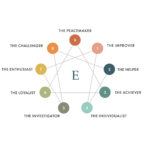You may have heard that setting healthy boundaries can help prevent burnout, protect your time and energy, and even improve your work-life balance. But what does setting healthy boundaries look like when it comes to your relationships?
Learning to set boundaries may feel confusing at times, especially for those who are naturally very helpful and giving. Many people fear that too many boundaries will create distance between themselves and the people they care about.
My goal is to show you how creating healthy boundaries in relationships will actually promote closeness and connection in your relationships.
What are boundaries in relationships?
The Oxford English Language dictionary defines the word “boundaries” as, “a line that marks the limits of an area; a dividing line.”
When it comes to relationships, boundaries act as the dividing line between where you end and another person begins. They can mark the limits of your emotional, mental, or physical capacity. Good boundaries also provide clear expectations for those involved in the relationship.
Here’s an analogy that might help you visualize how boundaries function in relationships:
Imagine a car driving on a road. Boundaries are like the lines on the road. They are designed to keep you in your lane. This helps prevent others from driving too close to you and allows you to drive safely and get where you are going in good time.
If there were no lines (boundaries), everyone on the road would be in constant danger of crashing into one another. This would cause confusion, accidents, and an inability to get anywhere safely or quickly.
Setting the stage for closer connection.
Healthy boundaries never seek to control the actions of others. They state what you are and are not willing to accept from others, and allow you to take responsibility for your own actions.
It might seem counterintuitive at first, but good boundaries actually set the stage for closer connection with the people in your life.
Let’s use another example to illustrate why boundaries actually encourage closeness, not the other way around:
Think of a boundary as a picket fence. This fence separates your property from that of your neighbor’s, and makes it clear to everyone that the plants in your garden are yours to care for.
The fence is low enough to see over. You can open the gate to let others in and out, but it clearly defines what is your space and what is not.
If you had no fence at all, people would potentially be walking over your carefully tended plants without realizing they are yours. This would cause confusion and resentment for both you and your neighbors!
In this way, you can see how a healthy boundary is a clear, firm line that allows others to access your life in ways that foster connection, not resentment.
How to set boundaries in relationships.
The best way to set a boundary in any area of your life is to be clear and direct. Expecting others to read our minds or guess what our boundaries are is not in the best interest of anyone.
When setting a boundary, whether in your professional or personal life, try to have a conversation with the other person during a time when everyone is calm. Setting a boundary during a fight, even if it is a helpful boundary, can make it hard for others to really understand what it is you are expressing.
Remember, a boundary is not about controlling someone else’s behavior. It’s the practice of expressing what your own limits are. It also offers an opportunity to set the expectation of what your response will be if that boundary is crossed.
Still not sure what setting boundaries could sound like in real life? Let’s look at some examples.
Recognizing healthy boundaries: examples to practice.
Here are some common boundaries that could be set in different situations and relationships. If they do not apply to your situation specifically, that’s okay! Simply notice the format and adapt them in a way that works for you.
NOTE: If you aren’t used to setting firm boundaries, it can feel scary or even make you feel as if you are being rude! It’s important to remember that you are simply stating what you are and are not willing to subject yourself to. You are not controlling or manipulating anyone by setting a firm boundary.
- Example Boundary in a Romantic Relationship:
“When you are on your phone throughout every date, it makes me feel unimportant. I expect that when we are having a planned date night, we put our phones on silent and give each other our full attention. Is that something you can agree to?”
- Example Boundary in a Familial Relationship:
“I noticed comments being made about my child’s weight at family functions. In our house, we practice body positivity, and part of that is the decision to not comment on each other’s size or shape. If comments about my child’s weight continue to be made, we may need to sit our family functions for a while.”
- Example Boundary in a Work Relationship:
“My contract states that I am allowed a full hour for my lunch break. These meetings being held over the lunch hour are making it difficult for me to take the break I am allowed. If we can’t move the meeting time, I’ll need to start asking for the notes from the meeting instead of attending so that I can take my legally allowed break.”
Respecting boundaries when others set them.
Everyone involved in a relationship should have the opportunity to express their own boundaries. It is important to listen to and respect the boundaries of others, even if they don’t always make sense to you.
If for some reason you are not willing or able to commit to respecting others boundaries, you may need to reassess the relationship or discuss the issue further with a trusted professional.
Boundaries, like lines on the road or garden fences, are there for a reason. Healthy boundaries that are respected by all parties involved will promote closeness, trust, and connection in your relationships.
If you still aren’t sure where to start with setting boundaries for yourself and in your relationships, I would love to chat with you. You can contact me here with your questions about boundaries, relationships, and how to show up for yourself authentically.







Excellent commentary on boundaries, such an important topic!
Thank you Amee! Wishing you all the best!